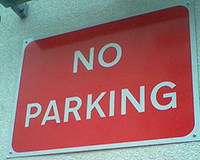The owners of a fish and chip shop in Keighley, West Yorkshire, don’t have the right to use the local Conservative club’s car park, even though their customers and suppliers have been ignoring the “private parking – members only” signs for years, the Court of Appeal ruled today.
The ruling asserts the right of landowners and developers to rely on well-worded and unambiguous signs to prevent rights of way disputes from taking place.
The fish and chip shop owners’ case relies on the concept of acquisition of property rights “by prescription”, which states that a person may acquire a right of way though long use. The fish and chip shop owners needed to show at least 20 years of uninterrupted use “without force, without secrecy or without permission”.
There is no dispute that suppliers and customers used the car park between 1992 and 2012, despite the “clearly-visible” private car parking signs, the judgment said, so the issue in question was whether the car park was being used “without force”.
The case has flip-flopped though the court system. It began in the First Tier Tribunal (Property Section), which found in favour of the shop owners, but the decision was reversed by the Upper Tribunal. The Court of Appeal heard the case in March this year.
Today’s judgment, written by Lord Justice David Richards, says that “‘without force’ carries with it more than its literal meaning. It is not enough for the person asserting the right to show that he has not used violence. He must show that his use was not contentious or allowed only under protest”.
Richards said that the existence of a clear sign meant that the use of the car park was contentious, so the shop owner’s case must fail. He said that landowners should not need to confront people trespassing on their land.
He made it clear that the ruling asserted the rights of landowners to protect their rights without being forced to defend them in court.
“The situation that has arisen in the present case is commonplace,” he wrote. “Many millions of people in this country own property. Most people do not seek confrontation, whether orally or in writing, and in many cases they may be concerned or even frightened of doing so. Most people do not have the means to bring any legal proceedings. There is a social cost to confrontation and, unless absolutely necessary, the law of property should not require confrontation in order for people to retain and defend what it theirs.”
“The erection and maintenance of an appropriate sign is a peaceful and inexpensive means of making clear that property is private and not to be used by others. I do not see why those who choose to ignore such signs should thereby be entitled to obtain legal rights over the land.”
Winterburn v Bennett, Court of Appeal (Sharp LJ, Richards LJ, Moylan LJ) 25 May 2016








